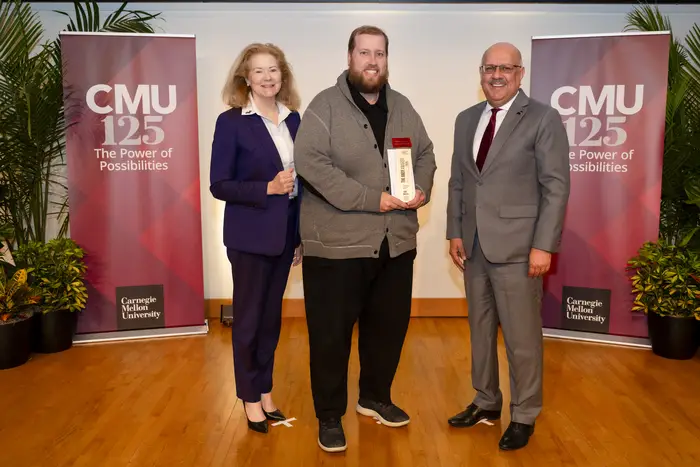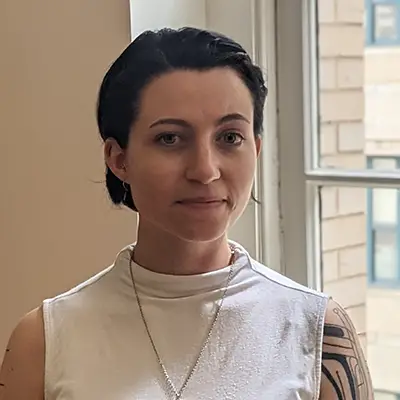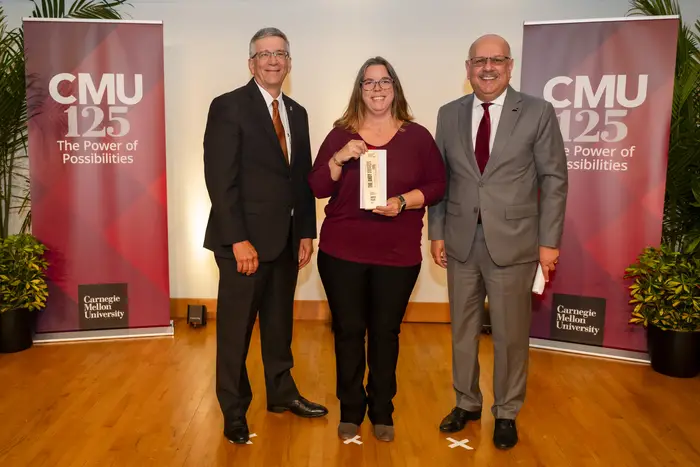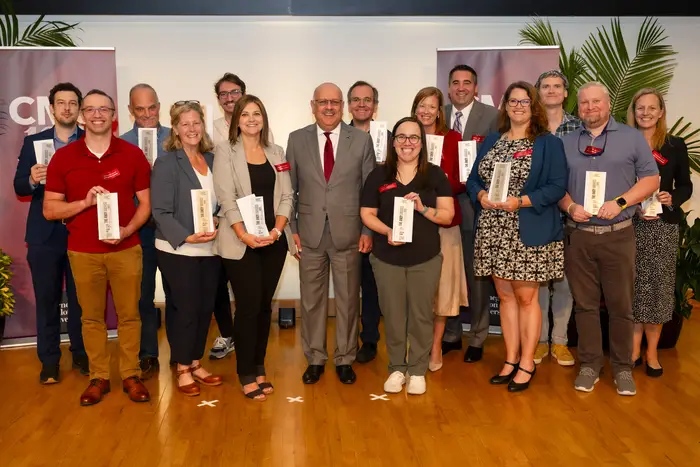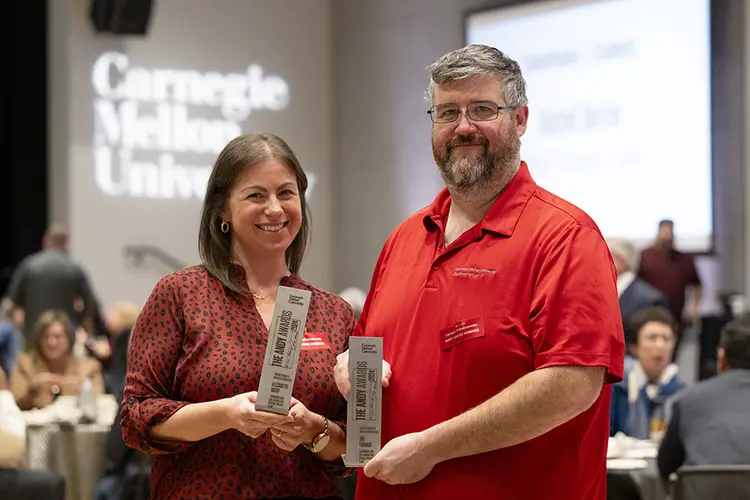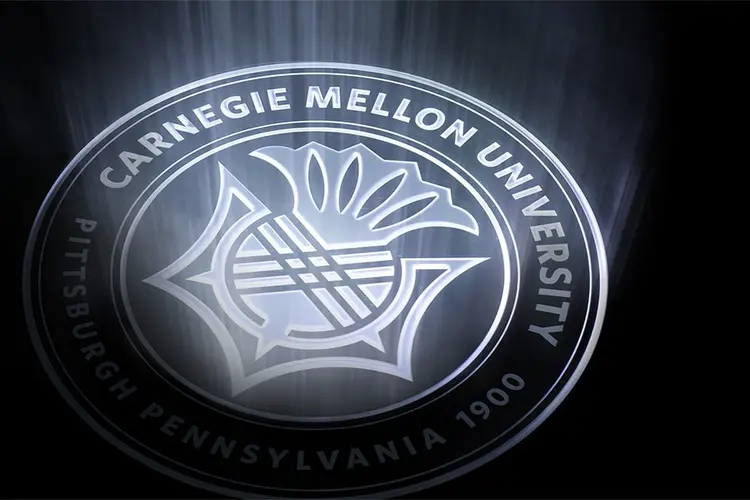


2025 Andy Awards Recognize CMU Staff for Outstanding Work
Media Inquiries
The university recognized seven staff members and two teams for their meaningful contributions at Carnegie Mellon University’s 31st annual Andy Awards(opens in new window) ceremony on Oct. 1 in McConomy Auditorium. In addition, Staff Council recognized 44 individuals celebrating 30 or more years of service to the university with Staff Service Awards(opens in new window).
The Andy Awards, named for Andrew Carnegie and Andrew Mellon, recognize the legacy that CMU staff members forge through their hard work.
This year’s nominees(opens in new window) included 50 individuals and 16 teams representing an array of departments, functions and responsibilities across the university. The 2025 Andy Award winners are:
- Commitment to Community Engagement: John Balash
- Commitment to Excellence (Rookie*): Maila Rible
- Commitment to Excellence (Veteran**): Amy Stoebe
- Commitment to Students: Brian Belowich
- Commitment to Vibrant Community: Candace Okello
- Innovative and Creative Contributions: Krystalyn Kovacs
- Spirit: Kaycee Palko
- Teamwork and Collaboration (Special Project): Federal Transition Data Analytics
- Teamwork and Collaboration (Standing Team): Center for Transformational Play Team
*recognizes staff who have been at CMU for fewer than three years
**recognizes staff who have been at CMU for three or more years
Commitment to Community Engagement
John Balash
Director of Academic Outreach, Extension and Engagement, Entertainment Technology Center
John Balash’s mission as a leader of the Entertainment Technology Center (ETC)(opens in new window) is to transform K-12 education with high-quality, playful learning experiences. His approach builds on a foundation of authentic relationships.
One of Balash’s greatest strengths is the ability to connect with just about everyone he meets.
“He has an incredible warmth and openness that comes across whether he is leading a workshop or chatting with you in the hallway,” said Jessica Hammer, director of the Center for Transformational Play (CTP). “Part of this authenticity comes from his open-heartedness, but it is also because he is one of the most curious people I have ever met. He wants to understand people and that makes his collaborators, both at CMU and among his community partners, feel valued.”
Rather than seeing partnerships as merely transactional, Balash insists on collaboration rooted in equity and mutual benefit.
“John doesn’t just build relationships — he builds trust,” said Jessica Kaminsky, a CTP project manager. “Community partners regularly comment on how heard and valued they feel when working with him. His name has become synonymous with partnership at CMU.”
At the heart of Balash’s impact is Project Baseplate(opens in new window), a network he founded in 2023 to strengthen connections between educators, researchers and local organizations. Inspired by the flexibility of a Lego baseplate brick, the program provides Lego activities to children across the United States.
Project Baseplate has trained more than 200 educators in playful learning practices and has expanded to national collaborations, including work with Play Included, a U.K.-based social enterprise.
Hammer credits Balash with raising the bar for how academic institutions engage with external partners.
“Relationships between researchers and communities can sometimes be extractive, but not when John is involved,” she said. “He doesn’t just speak up for the community partner’s needs and priorities during the project development process, he makes sure they are taken into account from the start.”
Balash’s work has touched thousands of students, teachers and community members. Since 2016, he has ensured that the ETC sponsors at least one K–12-focused project each year, expanding opportunities for playtesting and school engagement. Those initiatives have reached more than 700 students and educators over the past two years.
Sparked by a desire to constantly learn and improve, Balash is building a legacy that will extend far beyond these initiatives. He mentors colleagues on how to prioritize reciprocity and integrity in their community partnerships. By creating the Community Partner First Penguin Award, he ensured that the expertise of collaborators is celebrated and uplifted within the university.
ETC Director Derek Ham praised Balash’s ability to connect across scales, from local classrooms to national networks. “The tangible outcomes of John’s work far surpass those I’ve observed from peers in similar roles,” Ham said. “He’s a multifaceted leader, and there is no more deserving candidate for this award.”
Commitment to Excellence (Rookie)
Maila Rible
Communications Lead, Center for Transformational Play
Over her first six months at the Center for Transformational Play (CTP)(opens in new window), Maila Rible hasn’t merely done her job — she has redefined it.
“Maila steps up to serve the mission,” said Jessica Hammer, CTP director and associate professor of learning sciences. “She finds places where her skills are useful, connects with teammates and executes with excellence.”
Colleagues describe Rible as meticulous and imaginative. Her first task was to revamp the CTP website and build a social media strategy that aligned CTP’s messaging with the university’s broader goals.
The new website went live weeks ahead of the proposed deadline. “Maila made the process a joy rather than a dreaded chore,” CTP Operations Manager Avonelle Wing said.
CTP Game Design Lead Elaine Fath praised Rible for turning a low-performing social media channel into the team’s most effective recruitment tool, boosting sign-ups for a research study tenfold. “She not only delivered results but followed up weeks later to track outcomes and refine her approach,” Fath said. “That kind of dedication is remarkable.”
Recognizing the importance of financial sustainability, Rible identified ways to strengthen the center’s industry partnerships.
“She said we needed to host ‘wow-worthy’ demos and tours that would make us a more attractive stop for CMU’s development team and convince partners to invest in us,” Hammer said.
Working with the CTP staff, graduate students and collaborators from other departments, Rible identified a set of projects to showcase and ran a test visit for staff from University Advancement. That plan is now the CTP’s model for future industry engagements.
Rible took charge of the affiliate faculty program, more than a dozen professors across the university whose work intersects with transformational play. Rible is developing a strategy to build shared resources and foster collaboration across disciplines.
Her foresight prevents challenges from turning into crises. Knowing that CTP’s mobile game project would need promotional materials for upcoming festivals, Rible began capturing gameplay footage and developing a plan months in advance. That foresight avoided the department’s usual scramble for material after the student team members left campus.
Rible has displayed adaptability in CTP’s fast-paced environment. When a collaborator appeared on the television series “Lego Masters,” Rible immediately recognized a perfect tie-in to CTP’s Project Baseplate and transformed the opportunity into a widely shared news story(opens in new window).
“We are in awe of Maila’s ability to craft and execute strategy quickly without dropping anything else on her plate,” Wing said.
Beyond technical expertise, Rible has brought warmth and mentorship. She patiently coaches colleagues in crafting more effective communications, raising the whole team’s capacity. She also embodies CTP’s culture of excellence and well-being, helping train summer researchers in “the CTP Way,” which emphasizes thriving as human beings as well as producing great work.
“Maila is a teammate who, once established on a team, makes it hard to remember how we ever got on without her,” Fath said.
Commitment to Excellence (Veteran)
Amy Stoebe
Assistant Director of Writing and Communication, Department of English, Dietrich College of Humanities and Social Sciences
Amy Stoebe’s role in the Department of English(opens in new window) can be simply described as administrative leadership, but her impact goes far beyond logistics.
Each year, Stoebe ensures that nearly 2,000 incoming students find their place in First-Year Writing courses, while also managing 80 to 90 sections of writing and professional communication courses. She handles advising concerns, resolves scheduling challenges and supports more than two dozen faculty and graduate instructors. She also oversees strategic program development and faculty assessment, ensuring the program grows to meet student needs.
“Amy is the person who brings CMU’s sense of supportive community to life,” said Julie Pal-Agrawal, a lecturer in the program. “She makes students, faculty and graduate instructors feel genuinely welcome.”
That sense of welcome is practical and transformative. “Her warmth, kindness and welcoming presence foster a collaborative environment that deeply enriches the experiences of everyone fortunate enough to work with her,” English adjunct faculty member Rochel Gasson said.
During a recent sabbatical coverage period, Stoebe’s responsibilities expanded. She co-led departmental meetings, became the first point of contact for students and faculty, and kept the program running seamlessly while maintaining an open-door policy. “Her continued dedication is critical to our achievements,” said Andreea Ritivoi, who led the Department of English for 10 years before stepping down in July 2025.
Colleagues emphasize Stoebe’s ability to balance responsibility with humility.
“What is truly special about Amy is that, despite having a Ph.D., she will be the first to drag sodas to the faculty lounge in a wagon so we all have a drink at lunch,” Pal-Agrawal said. “She is a quiet force whose influence can be felt across campus.”
“Amy is often the person making strategic initiatives possible, supporting instructors through challenges and quietly solving problems behind the scenes, yet she is often a bit embarrassed when praised,” senior lecturer Courtney Novosat said.
“She is humble, honest, hardworking and innovative,” said Danielle Zawodney Wetzel, director of the Writing and Communication Program.
Stoebe’s strategic vision has shaped major curricular changes. Her work has enabled the expansion of specialized writing courses for computer science and health professions students, programs that now thrive thanks to her problem-solving.
Stoebe mentors graduate students in teaching roles about situations for which they rarely receive formal training, such as supporting struggling students and navigating classroom conflicts.
“Amy combines logistical, on-the-ground knowledge of university procedures with knowledge of educational research and theory,” senior lecturer Rebecca Wigginton said. “Students leave those conversations with the sort of practical knowledge they can apply to their immediate problem but also use long-term to form their own philosophies of teaching and sense of best practices.”
Commitment to Students
Brian Belowich
Facilities Co-Director and Senior Project Engineer, Department of Civil and Environmental Engineering, College of Engineering
During the fall 2024 semester, a class of engineering students were tasked with building habitats for mason bees. The project has become Brian Belowich’s signature contribution to the Department of Civil and Environmental Engineering (CEE)(opens in new window) and reflects a role he has ably filled for years: cultivating spaces where students (and bees) can thrive.
Belowich is a mainstay of the department — a mentor, teacher, engineer and advocate rolled into one — who builds not just bee habitats, but confidence, curiosity and community.
“Brian is one of the most visible and beloved members of our department,” said department head Burcu Akinci. “His approachable demeanor, quick wit and genuine care for students make him a constant source of support and encouragement.”
This is especially evident in the core sophomore course CEE Challenges: Design in a Changing World, in which Belowich has played a pivotal role in developing open-ended, community-engaged projects. He co-created the bee house project, in which students design, construct and install functional bee habitats in collaboration with regional partners.
“Brian not only helped shape the intellectual framework and logistics for the project, he brought it to life through personal initiative, community outreach and deeply engaged mentoring,” said assistant professor Katherine Flanigan.
Belowich’s fingerprints are on every aspect of the initiative. He secured partners including Phipps Conservatory and Botanical Gardens, the North Park Pollinator Gardens and Cleveland Metroparks. He organized hands-on woodworking and fabrication-skills training sessions.
When installation of the bee houses was delayed by freezing temperatures, Belowich didn’t shelve the project. Months later, long after the course ended, he drove student teams across Pennsylvania and Ohio to install their habitats.
“This was not required nor expected,” Flanigan said. “It is the natural continuation of Brian’s wholehearted investment in his students’ success and the integrity of their work.”
In the 2025-26 academic year, students are partnering with Carnegie Museums and Humane Action Pennsylvania to conduct ecological monitoring and research on the bee houses. “This next chapter is only possible because of the strong foundation Brian laid in his work with our students and community partners,” Flanigan said.
Belowich also has transformed CEE’s physical environment, retrofitting spaces to be more welcoming, collaborative and student-friendly. “These improvements have helped create a more inclusive and supportive atmosphere where students feel at home,” Akinci said.
As a mentor to student employees, Belowich provides technical training and guidance in teamwork, communication and leadership.
“Many students have commented on how their confidence in engineering and teamwork skyrocketed under Brian’s guidance,” Flanigan said.
“Brian’s ability to connect with students on a personal level is one of his most valuable qualities,” said Andrea Francioni Rooney, director of undergraduate programs. “He often recognizes when a student is facing challenges, whether academic, personal or social. His approachability and genuine care make him a trusted role model."
Alumni also remain deeply connected to him, often returning to share how his mentorship shaped their careers.
“In every aspect of his work, Brian goes above and beyond to support students’ academic, personal and professional growth,” Rooney said. “He is a tireless advocate for their success and a cornerstone of the CEE community.”
Commitment to Vibrant Community
Candace Okello
Assistant Dean of Student Affairs for Civility Initiatives, Office of the Dean of Students
In just two years at Carnegie Mellon University, Candace Okello has become synonymous with connection, care and community.
Through her leadership in civility initiatives(opens in new window), restorative practices and campus-wide collaborations, Okello has transformed the way CMU community members engage across differences and has strengthened community and interpersonal relationships.
“Candace embodies the essence of this award,” said Holly Hippensteel, associate vice president for community responsibility and culture. “She goes far beyond the responsibilities of her role to create a more inclusive, resilient and connected Carnegie Mellon.”
Over the past year, Okello has led more than 30 workshops, each one designed to meet the unique needs of its participants, whether student leaders, staff teams or academic departments. These aren’t just training sessions; they are transformative experiences that leave participants with new tools, fresh perspectives and a deeper understanding of what it means to live out CMU’s values in community with one another.
Her influence has also extended to critical institutional priorities. Okello played a leading role in establishing the Expressive Activity Support Team, a cross-campus initiative to support civil discourse and free expression while ensuring student well-being and safety. She authored guiding documents, built training infrastructure and centered student support in every decision, helping CMU navigate some of the most complex issues facing higher education.
Colleagues seek her out for her expertise and steady, empathetic presence.
“Candace’s ability to engage our student-athletes and coaches in meaningful conversations about civility has had a lasting impact,” said Josh Centor, associate vice president of student affairs and director of athletics. “She has helped elevate our teams, not just as athletes, but as communities of people committed to shared values.”
Her leadership stretches across divisions and disciplines. She co-leads the planning group for the Community Day of First-Year Orientation, contributes to the Dietrich College of Humanities and Social Sciences Civil Dialogue Committee and serves on the university’s Middle States Commission on Higher Education Accreditation Standard IV Working Group, helping CMU assess how it supports student success. She has even taken on mentorship of the Fifth Year Scholars program, advising students committed to making a positive impact on the university.
“Candace is one of the most talented facilitators of dialogue I have ever worked with,” said Patience Whitworth, associate vice provost for student success and strategic initiatives.
Okello’s contributions extend beyond her formal responsibilities. Whether volunteering at Spring Carnival, mentoring Tartan Scholars or serving on national committees such as the DEIJ group for the National Association of Community and Restorative Justice, Okello consistently models what it means to be a university citizen invested in the whole community.
“Candace is a difference maker,” Centor said. “She has made our community stronger, more vibrant and more rooted in understanding and love. I feel fortunate to have her as a colleague."
Innovative and Creative Contributions
Krystalyn Kovacs
Senior Academic Coordinator, Department of Biological Sciences, Mellon College of Science
Since joining the Department of Biological Sciences(opens in new window) in 2021, Krystalyn Kovacs has approached her role with energy, ingenuity and an ability to solve problems before they appear.
Officially, her responsibilities center on supporting undergraduate programs in biology and health professions. Unofficially, Kovacs also has become a linchpin for the department’s graduate programs, taking on work outside her role because she saw an opportunity to improve processes and experiences for students, faculty and staff.
“She has gone well above and beyond her role to make substantial impacts for our graduate programs,” said Daniel Brasier, assistant department head for graduate affairs. “Her creativity has saved me at least 50 hours a year and she doesn’t even work directly with me on a regular basis.”
When Kovacs saw a need to balance undergraduate, graduate and cross-listed courses, she built a system that harmonized schedules, faculty assignments and classroom reservations. That led to smoother operations and enabled the department to expand graduate-level offerings without overburdening faculty or compromising quality.
Commencement has become a hallmark of Kovacs’ leadership. In her first year, she faced the daunting task of coordinating ceremonies for three undergraduate cohorts delayed by the pandemic, while also launching the first master’s commencement. She handled those tasks with poise, turning logistical challenges into meaningful celebrations.
Kovacs has found ways to bring structure and clarity to these complex events. She created a Canvas page with deadlines and task lists for graduating seniors, which reduced confusion among students and families. She overhauled the process of collecting information from students throughout the academic year and broke down the data with color-coded spreadsheets.
“Krystalyn has transformed the way we plan for commencement,” said Amanda Willard, director of undergraduate studies. “She’s always raising the bar.”
Her innovations extend beyond commencement. In the Health Professions Program (HPP), which serves more than 500 students and alumni, Kovacs has overhauled advising systems through smart use of technology. She helped design a cloud-based mock medical school application tool, streamlined the recommendation letter process and built databases to track alumni across medical careers.
“Krystalyn is always willing to think and perform in creative ways outside her listed duties,” said Jason D’Antonio, associate teaching professor and HPP director. “She is incredibly reliable, professional, empathetic and kind.”
Kovacs’ colleagues often describe her as both an innovator and a steadying presence. She has taught herself programming tools and data analytics to track hundreds of alumni outcomes, created new systems for registering students in research for credit, and stepped in during crises with calm professionalism.
Her impact, they agree, is immeasurable. Kovacs has transformed processes, saved faculty time, improved communication, and made students feel supported and valued.
Spirit
Kaycee Palko
Academic Advisor, Department of Electrical and Computer Engineering, College of Engineering
When lousy weather prevented Buggy races from running as scheduled this past Spring Carnival, organizers mulled moving Sweepstakes to an unprecedented second weekend. Before making the final call, they sought advice from Kaycee Palko.
For 16 years, Palko was a fixture on the Buggy course, advising teams through early morning practices and cheering them on during the high-energy races of Carnival weekend. Her knowledge of the rules, commitment to student safety and the relationships she built with generations of participants earned her the Buggy Alumni Association’s Exceptional Service Award in 2023.
“Very few staff members can say they’ve stood at the top of Frew and Tech streets at 5 a.m., but Kaycee did that with regularity for many years,” said Elizabeth Koch, director of the Office of Student Involvement and Traditions. “The notion from staff and students that ‘We should call Kaycee’ (before rescheduling the races) tells me how persuasive her reach is within that community.”
Palko’s dedication to one of Carnegie Mellon University’s most cherished traditions captures the essence of her impact at the university. She shows up, connects people and makes the community stronger.
“She exemplifies what it means to lead by example and with clarity, collaboration and a deep belief in the CMU community,” said Matt Mroz, a technical writer in Human Resources who partners with Palko on Staff Council(opens in new window).
Palko’s 19-year career at CMU has spanned student life, academic advising and staff governance. She moved to the Department of Electrical and Computer Engineering (ECE)(opens in new window) in 2022 and already has left her mark.
Palko helped shape a comprehensive pathway audit for the ECE Bachelor of Science program, giving students and advisors a clearer roadmap for success. She also lends her deep institutional knowledge to colleagues, mentoring those who step into new roles and offering continuity for complex projects.
“She has an uncanny ability to recall critical details and historical context in the blink of an eye,” Senior Academic Advisor Monique Moreland said. “Her ability to breathe new life into long-standing or stagnant projects — adding flair, creativity and strategic insight — has been a hallmark of her approach and an inspiration to her colleagues.”
Whether she’s mentoring colleagues, advising students, volunteering at Almost Midnight Breakfast or organizing her office’s Thanksgiving basket drive, Palko’s actions embody the values of dedication and inclusion.
“This connector role really defines Kaycee,” said Megan Oliver, ECE director of advising. “She’s always the first to volunteer if we need a set of hands for anything within the department.”
A longtime member of Staff Council, Palko co-leads the Communications Committee, where she helps shape the Staff Voice newsletter and expands engagement across campus. Colleagues describe her as a natural mentor who builds confidence in others.
“She doesn’t just get things done; she brings people in and builds capacity in others,” Mroz said. “She models what it means to respect and value individual contributions. Kaycee understands how important it is to connect staff members not only to resources, but also to each other.”
Teamwork and Collaboration (Standing Team)
Center for Transformational Play
John Balash, Elaine Fath, Kaitlin Heller, Jessica Kaminsky, Maila Rible, Avonelle Wing
When Associate Professor of Learning Sciences Jessica Hammer founded the Center for Transformational Play (CTP)(opens in new window) in 2022, she aimed to assemble a staff that could collaborate across disciplines, solve complex problems and create a culture of trust and joy.
“This team has wildly exceeded my expectations,” Hammer said. “It developed the ‘CTP Way,’ a set of principles for the workplace that support people doing top-quality work while thriving as human beings.”
Instead of shying away from hard conversations, team members eagerly offer each other for help and support. As a result, problems are caught sooner and solved faster and nobody feels burned out by challenges.
That culture has powered remarkable achievements. When the team needed a stronger financial foundation, members from different backgrounds designed an internal workshop — using game-based methods, of course — to tackle issues from different angles and uncover solutions.
The group embraces shared goals and shuns individual glory. “When people know their contributions will be honored, they put their whole heart into the work regardless of who initiated the idea,” Hammer said.
When John Balash thought up Project Baseplate, a network connecting K–12 educators with playful learning activities, the team rallied behind it. Since 2024, the project has trained more than 200 educators in seven states and raised more than $500,000 in funding.
“The CTP doesn't just support students. It changes lives,” said Human-Computer Interaction Institute Learning Engineer Safiyyah Scott, who credits the center with transforming her career and her son’s future.
With CTP’s mentorship, Scott launched her own game company. She watched her son thrive in the pre-college Experience Designing Games: Education (EDG:E) program, an experience she believes paved the way for his recent acceptance to Carnegie Mellon.
“My son is exactly the kind of kid the EDG:E program was built for — full of potential but without the resources or access others might have,” Scott said. “Through EDG:E, he gained skills, confidence and a real pathway to higher education.”
That sentiment is echoed by Matthew Miller, a principal innovation consultant in the Office of the Chief Information Officer at CMU who has collaborated with the team. “The CTP reminds us that excellence can be joyful,” he said. “They design for collaboration, build inclusive solutions and bring out the best in everyone.”
By combining compassion with innovation, the CTP has created more than a workplace — it has built a community. Their Andy Award celebrates not only what it has accomplished, but the spirit of collaboration and care that makes it all possible.
Teamwork and Collaboration (Special Projects)
Federal Transition Data Analytics Working Group
Melissa Baker, Kristen Bridges, Elizabeth Callaway, Augie Delbert, Julia Sobol Dzurino, Brian Hill, Matt Hoolsema, Chelsea Horne, Luke M. Hottinger, Brandon Hutton, Mike Krisky, Chris Lambert, Mike Lopato, Teri McCort, Roman Mitz, Alexis Parker, Bo Powers, Jason Rae, Ken Smith, Derek Sommer, Bruce Stone
When a wave of federal policy changes created urgent new demands for data and analysis, an ad-hoc team of staff from across campus came together and turned what could have been a crisis into a model of collaboration and innovation.
The group, drawn from several departments, faced a daunting task. Lawmakers demanded detailed information about research funding, collaborations and compliance. Much of the data CMU had to supply was scattered across siloed systems, tucked away in PDFs or buried in decades-old platforms.
“It was a formidable technical undertaking,” said Amy Coutu, assistant vice president for academic enterprise applications and data in Computing Services. “The team had to navigate, analyze and synthesize data that existed across fragmented technical systems, many of which were never designed to interoperate.”
The team built custom AI tools to sift through contracts, extract hidden details and even replicate the logic of a high-profile U.S. Senate report. It tackled thorny problems of duplicate records, missing fields and inconsistent formats with creativity and persistence.
“What distinguished this team was its culture of mutual support and commitment to a common goal,” said Matthew Christian, chief of staff and assistant vice president of research for research strategic initiatives.
The team members worked late nights and weekends, stepping outside their day-to-day responsibilities to make sure CMU delivered accurate and timely information.
“Many of them had never worked together before but they quickly formed strong collaborative relationships,” said Lisa Hoebelheinrich, senior associate vice president and chief research operations officer. “They blended their diverse perspectives to tackle complex problems effectively.”
Not only did the team meet immediate federal reporting demands, but its work produced lasting tools. A new integrated reporting platform now gives CMU leaders a holistic view of the research portfolio, helping the university anticipate and navigate future challenges.
“What began as a reactive project evolved into a forward-looking capability, thanks to the team’s vision, technical excellence and collaborative spirit,” Coutu said.
